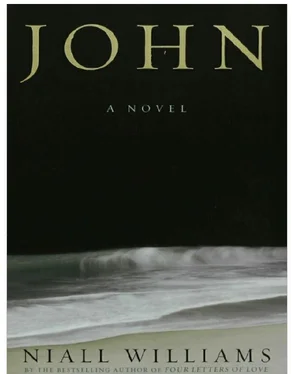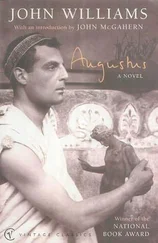Below, the sea unveiled, a boat waits. To it, in form like a snake, Matthias and his followers come. Behind them they leave their huts afire that nothing be left but darkened prints upon the ground.
I think of the multitude.
I think of the great multitude who followed you because they had seen your miracles on those who were diseased. The crowd whose number Simon Peter could not count but said were more than five thousand. Up the stony ground of the mountain following, the time of Passover near. The multitude in the heat of day. I looked back upon them, marvelling. How many there were. Philip saying to me, 'We become a nation.'
As we believed and were witness thereof.
The great company murmuring, whispering, expecting, climbing the mountain behind you to the place you led, where was a grassy expanse.
'Whence shall we buy bread that these may eat?'
The boy who carried five loaves and two small fishes. The sun shining upon the multitude.
I saw the loaves and fishes carried to you in the one basket. Your prayer of thanks over them, your eyes to the heavens. And breaking the loaves and fishes that they might be distributed among many and sending forth: 'Gather up the fragments that remain that nothing be lost.'
The twelve baskets that were filled. And again, and again, so a clamour arose among the multitude. They stood and cried out. 'O Prophet! O Most Mighty! Hail Holy King! Hail Holy King!'
For, in fervour then, they were for coming and taking you by force to be their king. The great multitude of your believers.
But you departed hence alone into the mountain.
We stood before the great assembly. Philip said, 'What number in the world there will be of us will outnumber stars.'
For so it seemed.
The multitude.
O Lord, if it be thy will, send us your mercy that we may abide.
If it be thy will, send us a sign.
'Papias?'
'Yes, Master?' Papias still cannot call the Apostle by his name. It does not seem fitting. For the truth is he wishes him to be other than mere human, not merely an old man called John.
They sit outside the cave in the afternoon. It is some days since Matthias and his followers have left.
'You are well?'
'I am.'
'What I ask you will obey, Papias?'
'You have no need to ask me.'
'Nonetheless. Answer me.'
'I will obey you.'
'God be with you.'
The weather is broken, the island in bleak light. What was empty before is now more so. Where before the younger disciples carried out many of the chores of the community, catching the fish, drawing the water, such tasks are now fallen to the elders. In the aftermath of the departure there is renewed vigour in belief, but hardship, too. The Apostle is aware of this. More than ever now he wishes their faith might be rewarded. He wishes there might be something to avouch for their staying on, for their refusal to surrender though their number is diminished. Long since, he has accepted for himself that there be no obvious exchange, between heaven and earth no simple traffic of plea and response, whereby all that is sought is granted. But nonetheless he feels there exists always the listening presence. He feels love. Always the prayer is heard; the judgement of its merits is the Lord's. But now, in the bleak aftermath, John feels the urgency of the time. There is a turning. He can sense it in the air, in the fall of the sea. It must be now. Now nears the hour. So he says to Papias, 'I am to ask the community of our brothers to fast with me. We will fast that our spirits be made pure and our prayers ascend. I will ask this of our brothers, but not you, Papias.'
'Not me? But I am the youngest. I am the most able. I. .'
'No. Not you, Papias. I command it.' John extends his hand, takes hold of the youth's shoulder. 'You have suffered and serve the Lord as he wishes. I am grateful for your love. But you should not fast. Bear with us. For forty days and nights we shall take only water. The time is near for our Lord.'

The disciples are told at communion. All consent. They eat the last bread and taste the last wine. Then quiet falls on them. Their faces are old and lined. The flesh of Ioseph's cheeks is white and sags from prominent bone. The bald head of Lemuel is wrinkle-creased, his brown eyes deep; Danil is in his sixth decade, narrow-jawed; Melitios, with the long face and blue eyes of Iconium, has forgotten his age; in his narrow chest Simon breathes wheeze. They are all in various manner infirm. In ordinary time they suffer the multitude of ailments visited on the aged — rheums and aches of joint, poorness of breath, wheeze and gasp and cough, vision blurry or marred with floating fish-hook nothings, dryness, deafness, flakiness, dolour of source unknown — and are poorly suited to the rigours of fasting. Nonetheless, each agrees without discourse. By nightfall they are begun.
The first days hunger comes for them. It comes like an unwelcome companion at mealtimes. Its teeth are sharp, its breath foul. It licks its lips with wet red tongue, spits aside the dust of the day and impatiently waits. It says the names of foods. Warm soup of lentils and beans. Pepper spices. Dipping bread. Pottage of sweet lamb with crushed herb of rosemary. Fat onions fried. Baked fish filleted with lemons sliced inside, drizzled over with honey. Touch it. Suck your finger burn. Taste the juices. Sip from the wineskin, pour and watch the beading bubbles, purple mouth swallow. Swallow in the gullet, for the good of it. Taste the sweetness of a honeyed cake, warm from the fire. Break its crust, go on, let free the scent, breathe it deep. Finger the soft food. Eat. Eat. Eat, the cruel companion urges. But the elders endure and do not relent. They sit with bowed head. Some pray the same prayer over and over so it curls about them and is cast like a cocoon. Others find a place, at first in the real, in the mid-distance, a rock, a minor landmark, and stare at this. They focus intently and do not move. They watch an hour, two; they watch while the stiffness comes in their necks and locks tight the vertebrae, they watch themselves into perfect stillness and on until through the place they see they see another, and this takes all their sight. To this other place they go, escape the unwelcome companion who cannot follow.
By the end of the first seven days they are already noticeably weaker, thinner, as Papias brings them water. How can they continue for another thirty-three?
The spring is coming to meet winter. Winds blow down off bright skies of swift white cloud. Seabirds in the twist of season fly low across the broken surface, search the first fish of season. The light changes by the moment. The heavens throw down fists of hail, darken the island then make brilliant with the sun. Light and shade compete across the stony shore, outpacing the flight of gulls. Suddenly the air warms. Up the coast of Greece come mild drafts, gusts carrying the scent of the lemon trees leafing. While the disciples fast, the sea turns blue before them. White sails cross. All is renewal. The plate of the earth itself seems borne upward toward the sun.
Whether the disciples note this or not, Papias cannot say. He comes and goes from each without word. They are both present and absent, their silence deep. The Apostle lies by night on the bed mat of dried rush, sits by day outside the cave, his face to the sun. What prayers he says, or whether he prays at all, remains a mystery. Does he sleep? Does he rest truly? The fasting is a purge of spirit, a paring back to the root. It is painful before it is purifying. In perfect stillness, their faces composed, some of the elders' eyes weep. Twin tears thinly gloss their cheeks, as though they mine a source. Then the water stops. They sit or kneel on, travelling further to another place in their soul, where some history of their weakness or failure awaits.
Читать дальше











